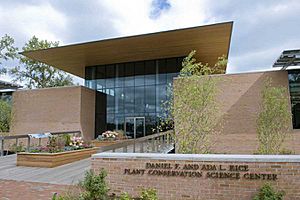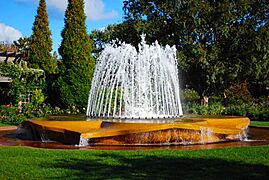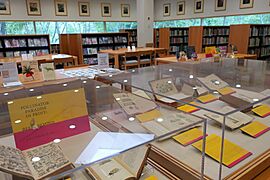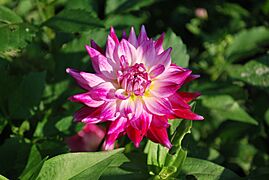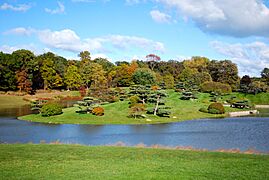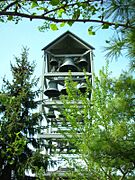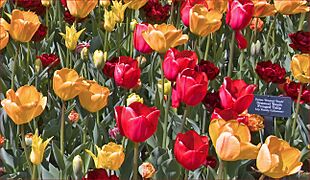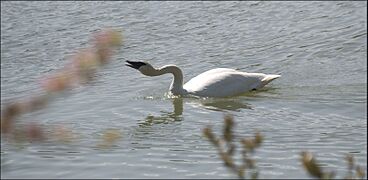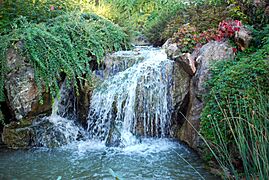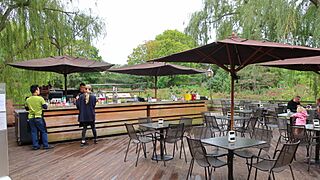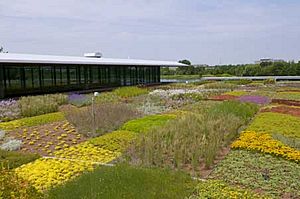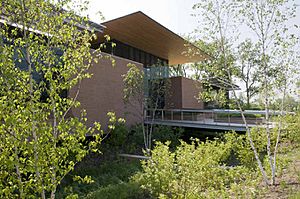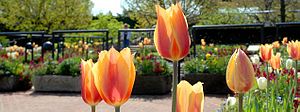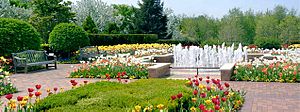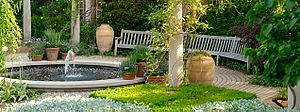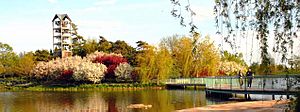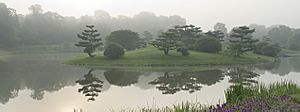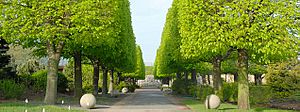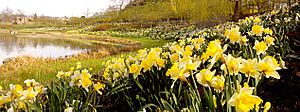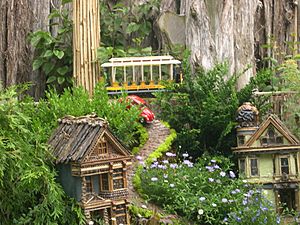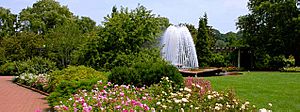Chicago Botanic Garden facts for kids
Quick facts for kids Chicago Botanic Garden |
|
|---|---|
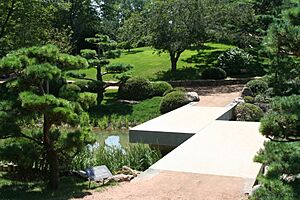
A zig-zag bridge at the Chicago Botanic Garden
|
|
| Type | Botanical |
| Location | 1000 Lake Cook Road, Glencoe, Illinois |
| Area | 385 acres (156 ha) |
| Owned by | Forest Preserve District of Cook County |
| Visitors | 953,846 (2011) |
| Status | Open year-round |
| Plants | 2.5 million |
| Parking | Paid parking, free to Garden members |
| Public transit access | |
The Chicago Botanic Garden is a huge, 385 acres (156 ha) nature park located just north of Chicago in Glencoe, Illinois. It's not just one garden, but a collection of 27 amazing display gardens and five natural areas spread across nine islands. It's a living museum with over 2.5 million plants!
The Garden is open all year round for visitors to explore its beautiful landscapes, which include woods, a prairie, and lakes. It first opened to the public in 1972. While visiting used to be free, the Garden started charging an admission fee in 2022 to help maintain the grounds.
The land is owned by the Forest Preserve District of Cook County, but the Chicago Horticultural Society manages everything. The Garden is also a place for learning. It has a school where people can take classes about plants and gardening.
Contents
Exploring the Gardens
The Chicago Botanic Garden is famous for its beautiful design and unique buildings. The original plan for the garden was created by John O. Simonds and Geoffrey Rausch. Over the years, famous architects have added special touches.
Some of the highlights include:
- The Education Center, designed in 1976 by Edward Larabee Barnes.
- The Japanese Garden, created in 1982 by Koichi Kawana, which offers a peaceful and traditional experience.
- The Esplanade, a beautiful walkway designed in 2004 by Dan Kiley.
- The Conservation Science Center, a modern building from 2009 designed by Booth Hansen.
Helping the Planet
The Garden is a leader in protecting plants and the environment. In 2009, it opened the Daniel F. and Ada L. Rice Plant Conservation Science Center. This building is so environmentally friendly that it earned a Gold LEED award, which is a top honor for "green" buildings. It even has a garden on its roof!
Saving Rare Plants
Scientists at the Garden work hard to save rare plants from disappearing. They are part of a global project called the Millennium Seed Bank Partnership. Their goal is to collect and save seeds from 1,500 different types of plants native to the Midwest. This "seed bank" acts like a safety net, making sure these plants can be grown again in the future.
They also run a program called Plants of Concern. This program keeps an eye on rare plants in Illinois to make sure their populations are healthy.
What is Sustainability?
The Chicago Botanic Garden practices and teaches sustainability, which means using resources wisely so they are available for the future. They turn food scraps and paper into compost to enrich the soil, use special irrigation systems to save water, and use as few chemicals as possible.
The Garden also encourages visitors to be sustainable at home. They teach people how to compost, collect rainwater, and plant native plants that are good for local wildlife. Through its Windy City Harvest program, the Garden even helps people learn how to grow food in city environments.
Awards and Recognition
The Chicago Botanic Garden is recognized as one of the best in the world.
- In 2006, it received the 'Award for Garden Excellence' for its high-quality gardening and commitment to teaching others.
- In 2012, the American Planning Association named it one of America's "Great Places." It was praised for its beautiful design, educational programs, and efforts in sustainability.
Gallery
Cool Facts About the Garden
The Chicago Botanic Garden has over 60,000 members! That's more than any other public garden in the United States. It's one of Chicago's biggest cultural places and a top tourist spot.
The garden has many different areas to explore, including:
- The Aquatic Garden (with water plants)
- Bonsai Collection (tiny trees!)
- The Bulb Garden (flowers that grow from bulbs)
- The Grunsfeld Children's Growing Garden (for young gardeners)
- The Circle Garden
- Crescent Garden
- Dwarf Conifer Garden (small evergreen trees)
- Enabling Garden (designed for everyone)
- English Oak Meadow
- English Walled Garden
- Esplanade (a wide open space)
- Evening Island
- Regenstein Fruit & Vegetable Garden (where food grows)
- Great Basin & Water Gardens
- Greenhouses (warm places for plants)
- The Green Roof (plants on a roof!)
- Heritage Garden
- Kleinman Family Cove
- Lakeside Garden
- Landscape Gardens
- Elizabeth Hubert Malott Japanese Garden
- Mary Mix McDonald Woods
- The Plant Evaluation Gardens
- Suzanne S. Dixon Prairie
- Native Plant Garden (plants from the local area)
- Model Railroad Garden (trains go through tiny landscapes)
- The Bruce Krasberg Rose Garden
- Sensory Garden (plants for all your senses)
- Skokie River
- Spider Island
- Waterfall Garden
See also
 In Spanish: Jardín Botánico de Chicago para niños
In Spanish: Jardín Botánico de Chicago para niños
 | Victor J. Glover |
 | Yvonne Cagle |
 | Jeanette Epps |
 | Bernard A. Harris Jr. |


